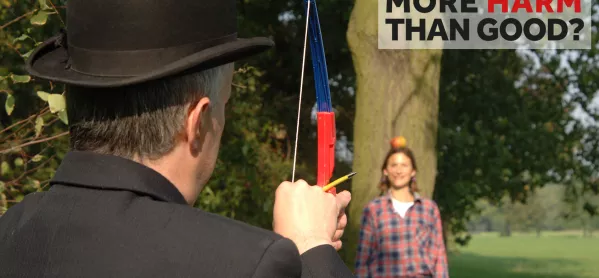- Home
- Exclusive: School accountability ‘doing more harm than good’
Exclusive: School accountability ‘doing more harm than good’

Ofsted, league tables and other methods used by government to hold schools to account are doing “more harm than good”, a panel of experts has found.
That is the damning conclusion of a heavyweight accountability commission due to publish its report later this week. It aims to find a way of holding schools to account which works for teachers, parents, pupils and politicians alike.
The NAHT heads’ union launched its Accountability Commission six months ago in an attempt to get decision-makers to rethink the country’s “high-stakes, low-trust” approach to measuring how schools are performing.
It has brought together a panel of senior figures from across the school sector to examine how the current system works and how it might be improved.
The commission has examined the role of Ofsted inspection, school league tables and government targets in improving schools and the impact they have on teachers and school leaders.
School accountability ‘needs a rethink’
It concludes: “The approaches used by the government to hold schools to account are acting as a brake to overall improvement and are, on balance, doing more harm than good.”
This week Tes’ “More harm than good?” series will feature exclusive reports on the commission’s findings and its recommendations for the future.
In our first reports today, we reveal that the commission found that Ofsted cannot make reliable judgements about school effectiveness in the time it has available to carry out inspections.
The commission claims the inspectorate is giving parents false assurance and has called for an honest appraisal of what should be expected of Ofsted on a massively reduced budget.
Throughout the week, Tes will report on the impact that the accountability system is having on the teaching profession and the commission’s recommendations for the future.
The NAHT Accountability Commission has been chaired by the union’s deputy general secretary, Nick Brook, and is comprised of senior figures from within in education. The commission members are: Professor Rebecca Allen (UCL Institute of Education), James Bowen (NAHT Edge), Marie-Claire Bretherton (education director, CfBT Schools Trust), Sam Butters (Fair Education Alliance), Sir Kevan Collins (Education Endowment Foundation), Amanda Hulme (headteacher, Claypool Primary School), Emma Knights (National Governance Association), Anne Lyons (NAHT immediate past president), Andy Mellor (NAHT president), Ross Morrison McGill (Teacher Toolkit), Dame Alison Peacock (Chartered College of Teaching), Tim Sherriff (headteacher, Westfield Community School), Michael Tidd (headteacher, Medmerry Primary School) and Carole Willis (National Foundation for Educational Research).
Their report is part of a growing weight of evidence that school accountability is no longer working. In March a Tes investigation revealed how the system used by the government for more than a quarter of a century is falling to pieces.
The commission has worked to a set of guiding principles of how it believes a school accountability system should work.
Teachers ‘have earned the right to be heard’
These include ensuring that schools are judged on the impact they have in helping to ensure pupils make the progress they should, being fair to all schools irrespective of circumstances or context, accepting the limits of data for holding schools to account, and to encourage schools to have a collective responsibility.
Mr Brook said: “When we look at the current system, it meets hardly any of the guiding principles that we believe should underpin the way schools are held to account.
“I hope we have reached a watershed moment where through this report the voice and experience of teachers can play a part in shaping the school accountability system.
“I think, after helping to deliver improvements over the last 25 years, teachers have earned the right to have their voices heard.”
Mr Sheriff, headteacher of Westfield Community School in Wigan, said: “Having been a headteacher for 20 years, I have seen the system we have now developing in terms of Ofsted and league tables. I think what we have is a moment in time to step back and ask, ‘How can we make things better?’ I am an optimist and I am not going to criticise the past but it is a question of ‘how can we improve?’
“The phrase that keeps getting mentioned is that we have a high-stakes accountability system and I think the system is ready to look again at how this works.”
Keep reading for just £1 per month
You've reached your limit of free articles this month. Subscribe for £1 per month for three months and get:
- Unlimited access to all Tes magazine content
- Exclusive subscriber-only stories
- Award-winning email newsletters



